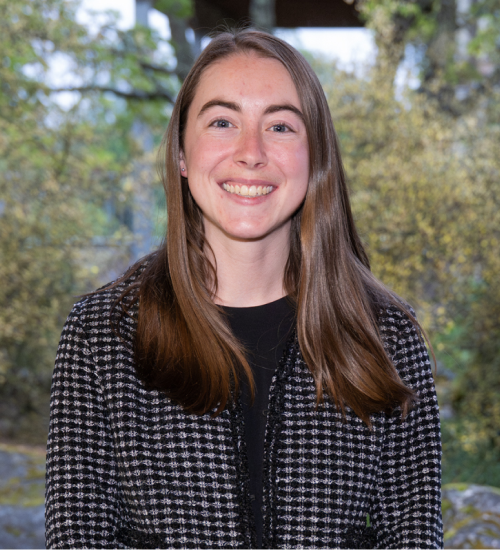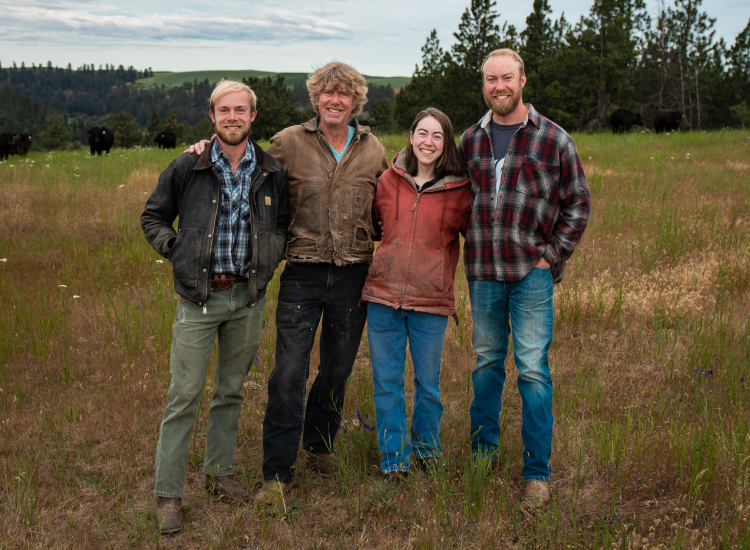Photo above courtesy of Chris Gray of Momentum.

“The scholarships I’ve received have made a real difference in my life. And because of them, I’ll be able to make a difference in the lives of people in rural communities, too.”
I grew up in West Seattle until I was 15, when my family moved to Colfax, Washington. My dad, a carpenter at the time, likes to say he was looking for a bigger backyard — and he found it with a 650-acre cattle ranch. None of us had any ranch experience, so we learned everything together, which made our already close-knit family even closer.
Still, adjusting to rural life wasn’t easy. At my new high school, everyone had grown up together since kindergarten, and I was the outsider from the city. It took time, but I eventually found my way. I made new friends and I thrived with the small class sizes and personal attention from teachers. I was also able to take niche science classes, like one focused on human body systems, that gave me the chance to visit the Washington State University anatomy lab. This experience confirmed my interest in biology and the dream that I could become a doctor one day.
After high school, I enrolled at Gonzaga University and earned a Bachelor of Science degree in biology with a minor in chemistry. When I returned home to Colfax, I began training as a certified nursing assistant (CNA) at a local rehabilitation center to get hands-on experience and make sure a career in medicine was something I wanted to pursue.
It was July 2020 — just five months into the COVID-19 pandemic.

“I grew up in West Seattle until I was 15, when my family moved to Colfax, Washington. None of us had any ranch experience, so we learned everything together, which made our already close-knit family even closer.” Photo courtesy of Chris Gray of Momentum.
A trial by fire becomes a deeper commitment
At first, all our CNA classes were online; everyone was still trying to figure things out. And then when we finally entered the rehabilitation facility, it was incredibly stressful. The building was split in half — one side for COVID patients, the other for non-COVID — and we were constantly short-staffed as employees also got sick.
I quickly learned how important it was to check in — not just with patients, but with colleagues. Many of us were exhausted and overwhelmed, just trying to stay strong. During that time, I developed interpersonal skills that continue to serve me today.
When I first told my friends and mentors that I was becoming a CNA, they asked me if it was something I really wanted to take on. Now I was on the front lines of a once-in-a-generation pandemic. But instead of making me want to quit or do something else with my life, it made me feel like I was on the right path. I saw being a CNA as an opportunity to help someone in their most vulnerable state. I felt ready for the next step and began the process of applying to medical schools, which can take around a year.
After working at the rehabilitation center, I took another CNA position at an assisted living facility in Colfax, where I built close relationships with the residents, many of whom I still visit. As the time neared for interview season — when medical school applicants meet with admissions committees — I nervously checked my email, wondering which of the 12 medical schools would invite me.
Each email, though, said the same thing.
I didn’t get in.
Growing through a gap year in Georgia
I now know that not getting accepted on the first try is common. But at the time, it felt like my life was over. I chose not to give up, though, and planned to continue my work as a CNA for the next year while I applied to medical schools again.
To my surprise, I received an email with an offer from a lab at Emory University School of Medicine where I participated in research as an undergraduate. They needed a research specialist to help with their studies on treatments for kidney disease. It meant moving to Atlanta, far from family and friends, but I was ready for something different.
I enjoyed working in the lab, and it was a year full of firsts. It was my first time alone in a big city, managing things like rent, utilities and insurance, and — unfortunately — getting into my first car accident.
Despite the challenges, I grew a lot, but I found that the city really wasn’t for me anymore. I realized I not only wanted to become a doctor — I wanted to practice medicine in a rural community like my own. In an encouraging sign, after submitting my second round of medical school applications, I was accepted by several schools and placed on the waitlist for the UW School of Medicine Spokane program. It was my first choice and where I really wanted to go.
One day in May, while I was waiting for a bus, I got the call that I was accepted and started screaming with excitement (much to the amusement of the people standing around me).
I was in.
An investment in scholarships is an investment in rural healthcare
When I was searching for medical schools, I always read their mission statements closely. Yes, I wanted to stay close to family, but what stood out about the UW School of Medicine was its commitment to improving health in underserved communities. Now, as a student, I have the opportunity to be part of that mission.


